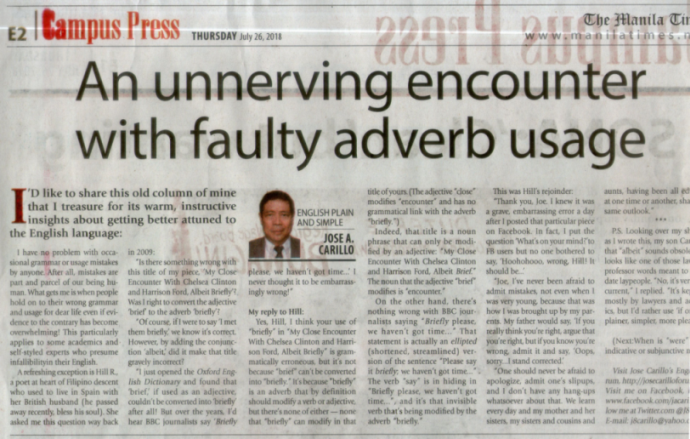I’d like to share this old column of mine that I treasure for its warm, instructive insights about getting better attuned to the English language:
 “‘MY CLOSE ENCOUNTER WITH WASHINGTON, D.C., ALBEIT (BRIEFLY, BRIEF)?’”
“‘MY CLOSE ENCOUNTER WITH WASHINGTON, D.C., ALBEIT (BRIEFLY, BRIEF)?’”I have no problem with occasional grammar or usage mistakes by anyone. After all, mistakes are part and parcel of our being human. What gets me is when people hold on to their wrong grammar and usage for dear life even if evidence to the contrary has become overwhelming! This particularly applies to some academics and self-styled experts who presume infallibility in their English.
A refreshing exception is Hill R., a poet at heart of Filipino descent who used to live in Spain with her British husband (he passed away recently, bless his soul). She asked me this question way back in 2009:
“Is there something wrong with this title of my piece, ‘My Close Encounter With Chelsea Clinton and Harrison Ford, Albeit Briefly’? Was I right to convert the adjective ‘brief’ to the adverb ‘briefly’?
“Of course, if I were to say ‘I met them briefly,’ we know it’s correct. However, by adding the conjunction ‘albeit,’ did it make that title gravely incorrect?
“I just opened the
Oxford English Dictionary and found that ‘brief,’ if used as an adjective, couldn’t be converted into ‘briefly’ after all! But over the years, I’d hear BBC journalists say ‘
Briefly please, we haven’t got time...’ I never thought it to be embarrassingly wrong!”
My reply to Hill: Yes, Hill, I think your use of “briefly” in “My Close Encounter With Chelsea Clinton and Harrison Ford, Albeit Briefly” is grammatically erroneous, but it’s not because “brief” can’t be converted into “briefly.” It’s because “briefly” is an adverb that by definition should modify a verb or adjective, but there’s none of either—none that “briefly” can modify in that title of yours. (The adjective “close” modifies “encounter” and has no grammatical link with the adverb “briefly.”)
Indeed, that title is a noun phrase that can only be modified by an adjective: “My Close Encounter With Chelsea Clinton and Harrison Ford, Albeit
Brief.” The noun that the adjective “brief” modifies is “encounter.”
On the other hand, there’s nothing wrong with BBC journalists saying “
Briefly please, we haven’t got time...” That statement is actually an
ellipted (shortened, streamlined) version of the sentence “Please say it
briefly; we haven’t got time...” The verb “say” is in hiding in “Briefly please, we haven’t got time...”, and it’s that invisible verb that’s being modified by the adverb “briefly.”
This was Hill’s rejoinder:
“Thank you, Joe. I knew it was a grave, embarrassing error a day after I posted that particular piece on Facebook. In fact, I put the question ‘What’s on your mind?’ to FB users but no one bothered to say, ‘Hoohohooo, wrong, Hill! It should be...’
“Joe, I’ve never been afraid to admit mistakes, not even when I was very young, because that was how I was brought up by my parents. My father would say, ‘If you really think you’re right, argue that you’re right, but if you know you’re wrong, admit it and say, ‘Oops, sorry...I stand corrected.’
“One should never be afraid to apologize, admit one’s slipups, and I don’t have any hang-ups whatsoever about that. We learn every day and my mother and her sisters, my sisters and cousins and aunts, having been all educators at one time or another, shared the same outlook.”
***
P.S. Looking over my shoulder as I wrote this, my son Carlo said that “albeit” sounds obsolete, and looks like one of those lawyer or professor words meant to intimidate laypeople. “No, it’s very much current,” I replied. “It’s kept alive mostly by lawyers and academics, but I’d rather use ‘if only.’ It’s plainer, simpler, more pleasant.”
 This essay, 1102nd of the series, appeared in the column “English Plain and Simple” by Jose A. Carillo in the Campus Press section of the July 26, 2018 issue (print edition only) of
This essay, 1102nd of the series, appeared in the column “English Plain and Simple” by Jose A. Carillo in the Campus Press section of the July 26, 2018 issue (print edition only) of The Manila Times
, © 2018 by the Manila Times Publishing Corp. All rights reserved.(Next:
When is “were” in the indicative or subjunctive mood?) August 2, 2018